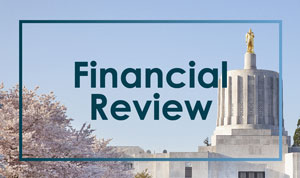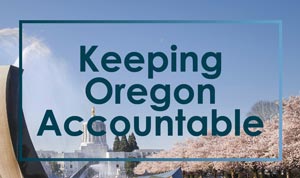
Concurrent enrollment occurs when a person is enrolled in Medicaid in multiple states at the same time. This means two or more states are paying for the same person to have Medicaid benefits at the same time — a wasteful expenditure of limited tax dollars. For this audit, we collaborated with the U.S. Department of Health and Human Services Office of Inspector General (HHS-OIG) and the Office of the Washington State Auditor.

DMV serves over 8,000 people on average each day and 2 million each year. The Oregon License Issuance and Vehicle Registration system (OLIVR) allowed for DMV to expand its online service offerings. Before implementation in 2019, DMV offered only three online services; it now offers more than 20.

The Oregon Eligibility System (ONE) is a complex system used by the Oregon Department of Human Services and the Oregon Health Authority to determine eligibility and benefits across a wide range of aid programs such as Medicaid and SNAP.

DEQ administers and enforces environmental laws pertaining to air, water, and land quality and ensures compliance with federal environmental regulations on behalf of the EPA. Strategic planning can help regulatory agencies like DEQ address the key principles of good regulatory governance and take steps to meet its mission.

The State of Oregon manages over 45,000 committed workers who perform a wide variety of roles delivering important public services such as public safety, education, healthcare, transportation, and more. As the largest single employer in Oregon, state government must actively and comprehensively manage its workforce to meet current and future needs of the people of Oregon.

Secretary of State LaVonne Griffin-Valade and the Oregon Audits Division are pleased to announce the 2024-25 Annual Audit Plan.

The Oregon Medical Board (OMB) regulates health care professionals, with the mission to protect and promote the health, safety, and well-being of Oregonians. In addition to licensing and education, OMB investigates and disciplines licensees for violating Oregon’s Medical Practice Act. The board receives roughly 700 to 800 complaints a year.

OHCS administered the Emergency Rental Assistance Program under emergency conditions during the pandemic and intense public pressure to quickly distribute funds. This audit reviewed the agency’s oversight of emergency rental assistance funds. Included are findings from federal financial audits of the Oregon ERA program for fiscal year 2022.

Voter approval of Ballot Measure 110 (M110) led to a first-in-the-nation law coupling decriminalization of drug possession with new services to expand drug treatment availability. Controversial from the start, M110 attracted more scrutiny when funding of services was delayed and decriminalization took effect amid an explosion in fentanyl use.

Ease of access is critical for timely and effective domestic violence interventions. However, victims face multiple access barriers. Victims and survivors often face fear, isolation, shame, and stigma, as well as financial, mental health, and cultural challenges. Regional organizations play critical roles in providing services.

The Secretary of State Audits Division annually audits the State of Oregon's financial statements and compliance with federal program requirements. The results of these audits are summarized in the annual Keeping Oregon Accountable report.

Oregon’s extreme risk protection order (ERPO) law, commonly referred to as a “red flag” law, has been in effect since 2018.
Image by
Freepik.

Prescription drugs reduce the need for medical services and improve and extend life. While efforts to lower drug prices have targeted manufacturers, there is growing interest in reviewing the influence of pharmacy benefit managers (PBMs).

The horse racing industry, which has been regulated for almost a century, faces challenges around its financial stability.

On Equal Pay Day, Secretary Fagan releases report on Oregon’s Pay Equity Law, finds wage gaps remain six years after implementation.

Water insecurity is a reality for many Oregon residents and a growing risk for many more. Ongoing drought conditions and concerns around the quality, safety, and accessibility of water have demonstrated the need for better governance to protect Oregon’s water security.

Ballot Measure 110 (M110), which passed with 58% of the vote, is a first-in-the-nation program decriminalizing drug possession and allocating over $100 million per year in cannabis revenue to expand treatment services. Advocates of M110 hope it will succeed where previous recovery and treatment efforts have failed, especially when it comes to supporting Black and Indigenous communities and people of color.